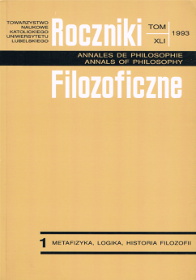Byt i nieskończoność w filozofii N. Malebranche'a. Dowód na istnienie Boga z prostego oglądu. (Część druga)
Abstrakt
In the reviews of the philosophy of Malebranche we may come across some radically different interpretations of the proof for the existence of God from simple view (la preuve de simple vue). The discrepancies concern both the character of the proof and its value. Is it a discursive proof, or else it depends on the immediate apprehension of the existence of God? How many versions of the proof can one find in the works of Malebranche, one or a few? Is Malebranche, by laying down this proof, in agreement with his own principles of philosophy? Or else he makes the mistake of petitio principii? Is the proof from simple view an ontological one in the Kantian sense? The basic principal purpose of this paper is to answer the above questions.
Malebranche claims that we come to know God in a direct manner in His existence. This statement is not, however, a direct and obvious truth, which would not call for a rational justification. It is directly obvious that the human mind gets to know the infinite, that is it has the idea of (in the broad sense of the word) the infinitely perfect Being. It is not, however, directly obvious whether this idea corresponds with the really existing ideatum. It may happen that this idea is only a modification of the knowing mind. The transitions from the infinite as it is comprehended by the mind to the really existing infinite bears the character of reasoning. The latter is carried out in accordance with the Cartesian conception of deduction. Malebranche calls the direct Cartesian deduction a "simple view".
One should distinguish two version of the proof for the existence of God from simple view in the works of Malebranche. The first one is based on the premise: "No thing that is finite can represent the infinite". This premise is a complex enthymematic reasoning. It does not satisfy the criteria of being a proof from simple view. The second version, based on the premise "Nothingness is unknowable" satisfies the criteria of knowing by simple view. It is, however, involved with Malebranche's peculiar philosophy of cognition, which determines the criteria of valuable knowing. The proof from simple view is not an ontological proof in the Kantian sense.
Copyright (c) 1993 Roczniki Filozoficzne

Utwór dostępny jest na licencji Creative Commons Uznanie autorstwa – Użycie niekomercyjne – Bez utworów zależnych 4.0 Międzynarodowe.





